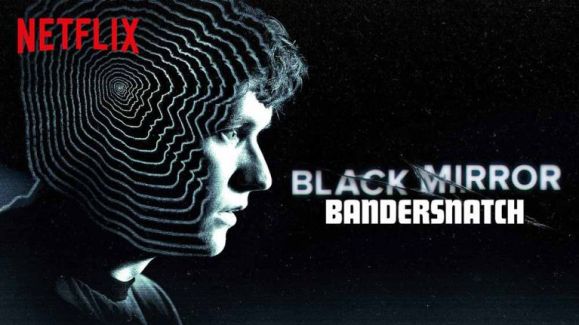Black Mirror is known for its dystopic takes on humanity. On the surface, “Bandersnatch” is not in that realm, but if you dig a little deeper and delve into the multiple endings the episode provides, then you may see the odd dystopia Charlie Brooker and Co. are hinting at.
Perhaps the best example of a unsettling future is when Stefan asks his computer, “what is Netflix?” and his computer responds in kind by saying, “It’s like tv, but online. I control it.” This sort of meta commentary is what makes Black Mirror so great. Netflix certainly has a hold on television at the moment and shapes how people watch it. And now, by allowing the viewers to literally control what they are watching as they are watching is quite literally putting the control right into people’s hands.

With all this control given to us, the viewers, it begs the question, how much of our own lives do we control? Or is it just the illusion of control? We are given a story with the ability to navigate our way through some scenarios. But did our choices ultimately matter? I am not so sure. Just because we can select one of two options for a given scenario does not mean that we have a complex choice ahead of us? One that would split one way or the other? We may have been heading for that ultimate conclusion anyway. The choices laid out are preordained.
After perusing through the internet a bit to gauge the reaction of others, I saw one comment in particular that struck me. Many people did not like how the story would end and simply reset, bringing you back to the stem of the problem. How can it be choose your own destiny if you get to re-do it? Where are the consequences? Well, simple. “Bandersnatch,” the adventure story that influences our protagonist, is not a real book. However, the type of book it was based on is very real. Before video games, you could read these types of adventure novels and come to different endings, much like this Black Mirror episode.
Early on in the episode, Stefan’s dad notices his son constantly going back-and-forth while reading the book in his hands. He proceeds to make an off-hand comment questioning how well-written the book is if you constantly have to go back and re-read certain parts. This is where we get Stefan’s explanation that it is a choose-you-own-adventure book, so he is simply going to to certain points to see what differences may occur. If he does not like the outcome, or dies or has his story end or whatnot, he can go back and change it. But this change is still only limited to the choices given to us by the creator. In a nutshell, this is core essence of “Bandersnatch.” We flip back and forth and see what ending we like best, with the occasional dead end, but ultimately we are left to the choices made by the creator.
“Bandersnatch” does a great job at subverting expectations. By putting us in the driver’s seat, we think we have control. However, the authors of the work have the control and we follow their decision logic. We go where they want us to take the story. We live in a culture that is controlled more and more by the almighty algorithm. Each day we give over more culture to the AI without giving it a thought. Programming controls the way we think and “Bandersnatch” is the evolution of that idea. We are simply along for the ride.
In the end I would say “Bandersnatch” is a worthwhile entry into the Black Mirror lexicon. Much of what the show has evolved into has been much more heavy-handed than its earlier work. Then this episode drops and there was criticism about how it does not connect with the cultural zeitgeist like episodes have done so in the past. That is because on the surface it is merely a episode of television where we control the actions. But in reality, we are the ones being controlled. Controlled to such an extent we do not even realize it. So I ask again, what is control and who has it?